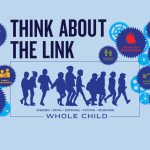The Neag Foundation has provided the UConn Collaboratory on School and Child Health, co-directed by Neag School’s Sandra Chafouleas, with a two-year grant to facilitate work in the Think about the Link Project.
The Neag Foundation has provided the UConn Collaboratory on School and Child Health (CSCH) with a two-year grant to facilitate work in the Think about the Link Project. The project builds from the CDC’s Whole School, Whole Community, Whole Child (WSCC) model to fully acknowledge the many interrelated components involved in supporting student well-being. The Think about the Link Project offers practical tools to help schools enhance their work by incorporating the WSCC model in decision-making across academic, social, emotional, behavioral, and physical supports.
“We had had a concerted effort to work with more urban districts in the state,” said Casey Cobb, professor of educational policy at the University of Connecticut, who helped reorient UCAPP’s approach to district partnerships. “But we never had formal partnerships beyond one with the Hartford School District. The Wallace initiative gave us the opportunity to reach out to districts to support their leadership development pathways.”
“It is an opportunity for baseball to give back, not only in a way to entertain, but to bring us back to a place of engagement as a team. Although baseball is non-essential, what we’re missing is that spirit of team and we could use that not only on the field, but also for our country and to figure out how we can address these issues in our country,” Glanville said.
Six of these faculty members met earlier this year at the UConn Hartford campus in the historic Hartford Times Building to discuss changes in the program thus far, elements that appear to work well, elements that present some challenges and directions the program may take in days and years ahead. Wallace’s editorial staff had the opportunity to listen in and report back.
Cyberbullying could worsen during distance learning unless districts focus on positive online environments for kids, experts say.
The specific factors exacerbating potential threats include more access to technology, less adult supervision, and fewer distractions, said Sandra Chafouleas, a professor at the University of Connecticut’s Neag School of Education.
“Take time to care for yourself. Pause, listen, and catch your breath. Then make sure everyone around you can breathe, too,” says Dean Gladis Kersaint.
Black lives matter. We share the grief, sadness, and anger at the loss of George Floyd, whose murder follows so closely on that of Breonna Taylor, Ahmaud Arbery and so many others. Each of their lives, like each and every Black life in our community and around the world, is unique, beautiful, and irreplaceable, and deserving of respect and dignity. The great and abiding shame of our nation is our inability to acknowledge, confront, and redress the legacy of white supremacy and the failure of our institutions, particularly our law enforcement institutions, to respect the human rights of black and brown people.
Our hearts ache. George Floyd’s life matters. Breonna Taylor’s life matters. Ahmaud Arbery’s life matters. Black lives matter.
We are reaching out to share resources that we believe might be helpful as you reflect on the current and ongoing racism in our country. We hope that these resources will help you reflect on and process the current moment. Of course, this list is not exhaustive, as there are so many dynamics, so many theories, so many histories to grasp in order to do our work of understanding anti-racism. We hope it will, though, provide a place for you to start or some new directions to go. As you find useful resources, please continue to share and learn together.



